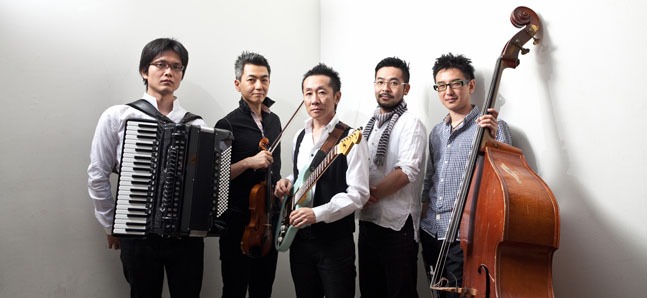
Posted: Thu Jul 22 2010
Salle Gaveau, the five-piece band headed by Natsuki Kido (guitar), performs a range of genres from progressive rock to jazz. Influenced by Astor Piazzolla –master of the Argentine tango – the band has achieved its own world-view has just finished off its third album, ‘La Cumparsita’. Time Out Tokyo had a long talk with Kido and bandmate Naoki Kita (violin) not only about the album (which has artwork on its inside jacket by the great Taro Okamoto), but on a range of topics from the very heart of Salle Gaveau’s music to what Buenos Aires and Jimbocho have in common.
So Salle Gaveau was formed in 2003. What kind of concept did you have at the time?
Kido: I had started out with Ryoto Komatsu’s tango band and through playing a range of Piazzolla’s music with them I was hit with this feeling of ‘I didn’t know there was music this good’. I had originally been a fan of progressive rock but there was a period where I was really into the unique groove of Latin music. I felt that the Piazzolla’s music was a blend of progressive rock’s precisely structured layers of beauty and sensuality with Latin music’s continuous groove and emotion. I wondered if we could bring this music forward into something more contemporary. So, I had this idea to begin with and after I quit Komatsu’s band I met the current members all around the same time.
Kita, what did you think when you first heard the band’s concept?
Kita: I was basically already writing Argentine tango, but rather than it being music that could be improvised, the melody hardly had any elements of adlibbing, improvisation and the like in it – it was almost as if I was faking it. Like Kido, I had already been in a regular tango band when Salle Gaveau first formed. One day Kido came up to me and said ‘I’ve written this song. Can you play it?’ and handed me the music. It was clear that the music had been influenced by Piazzolla. He said, ‘Play it how you want to play it from here to here’. [Laughs] I thought that was pretty funny and for me it was something new – in the sense that while there are sections that had been composed with a firm structure, the music also included impromptu performances for each band member.
Kita, you trained in the violin when you were living in Buenos Aires, however what was it that interested you about tango?
Kita: First of all, it’s full of musical contrivances. ‘Is there anything these guys can’t do?’ That’s how tight the arrangements are. Sometimes you can even hear progressive rock or contemporary music sounds. At the same time, it contains a kind of ballad. It was especially the ballad aspect that attracted me and got me started in tango. Tango is music that was born out of hardship and weakness and there is no denying its lyrics are ballad lyrics. Tango was a world full of passion between men and women, and a kind of nostalgia about places to which one had never returned. However, it’s not just awash in emotions: musically it’s highly arranged. It’s cool and sometimes humorous. It’s really trying to do something interesting as serious music. It’s rational at the same time as being emotional. These are the kind of things that attracted me.
Kido: I think South American music has a certain rustic emotion. This is probably in contrast to progressive rock, which sings in a refined manner about being head over heels in love. For me personally, I like the expression in the ballads and there are parts where it is aiming for a co-existence between complex composition and rustic emotion. Salle Gaveau’s performances are certainly progressive but in the really intense songs, the performers are trying to directly let out their emotion.
Kita: That’s right.
Kido: I’d say it feels like a progressive enka ballad. [Laughs] While I am Japanese, I would like to do things a little more directly. Ultimately, it’s music that is about more than just its musical construction – for example its elaborate harmony or the precision of its ensemble – it’s music where you can hear the almost wild emotion. That’s the music that I want to do.
The names of the songs are also filled with this imagination, for example, ‘Jimbocho yumagure’ [‘Evening twilight in Jimbocho’].
Kita: I love Jimbocho and go there often. It’s a town that suits the setting sun. [Laughs] But, don’t you think that Jimbocho and Buenos Aires share some similarities? It’s in their retro-ness. It’s got bookstores and old coffee shops…When I went to Buenos Aires I felt it had a slight air of Jimbocho.
I’ve got to say that when I went to Buenos Aires, I did feel a sense of nostalgia.
Kita: See! It’s strange isn’t it? When I was daydreaming over a cup of tea in a café in Buenos Aires, I thought to myself that wasn’t this town after all made up of temporary residents. You might call it an imaginary town. It’s a town where the Europeans that settled on land on the banks of the South American continent built Italian or Spanish style buildings in the manner of their hometowns. You might say there is an ever-present consciousness of Europe. It feels like the city is ingrained with a sense of belonging to Europe and this has led to an inevitable sense of nostalgia that has been built from the ground up. But Jimbocho isn’t a town of immigrants. Most people will have a sense of nostalgia towards their student days or days of youth and I think Jimbocho represents that. Therefore really it doesn’t matter whether it’s Waseda, Hongo or Egota [that you went to school]. [Laughs] But both Jimbocho and Buenos Aires are cities, which have being coloured by nostalgia in common, and I think this is what connects them.
By the way, you also play fairly often in Europe. What kind of response do you get there?
Kido: On the whole it has been pretty good. The place that had the biggest impression on me was Paris. When it got to the end of the song ‘Null Set’ from our first album, the audience gave this ‘ahh’ in unison. The ‘ahh’ meant: ‘I see, so you can end a song like that’. I remember being happy realising that they had understood what I wanted to say.
Your live performance at Roppongi’s STB139 on Fri June 23, 2010 was the first performance of your album release anniversary tour. How did you all feel playing live in Tokyo to start with?
Kido**: For me, it’s my home base and I feel that we have to get the stamp of approval here. That’s because people around the world pay attention to what goes on in Tokyo. It was great that we could also perform yesterday at STB139, which is a classy venue.
Kita: I was really pleased that our band could perform in such a big venue because playing in a big space ultimately makes you play much better.
Kido: I have been told by a member of the audience before, ‘The energy when you play in a small space is just too much for us’. [Laughs] For that reason, playing somewhere big like that is probably just perfect.
The album ‘La Cumparsita’ is your third album. Do you feel like the band has really gelled with this album?
Kido: We get tighter after we record. We recorded the album in January, and in March we did a show for the first time in awhile and it was really amazing. We intended to polish each song before recording this album but the songs got even better when we recorded it.
Kita: The playing then listening back, ultimately makes recording itself the best practice of all.
Kido: I feel like in this album we got closer to my ideal sound. While it has some improvisation, it almost felt like the performance had been completely written [in a score]…That’s the kind of performance it felt like it was close to.
You are planning to tour the whole country in July, right?
Kido: It really makes me happy that we can share Salle Gaveau’s music with people everywhere. But, more than anything, doing one performance after another helps make our band stronger. That’s what I really look forward to.
Kita: And if we can do it getting along well together without fighting. [Laughs]
Kido: Also on August 10, we are going to perform with guest Tatsuya Yoshida at the Shinjuku Pit Inn. The musicians in Salle Gaveau are great, but I feel like we can do some interesting things with Yoshida on board. It would be great if we can create some new music with Yoshida.
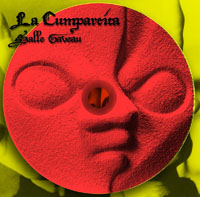
Salle Gaveau ‘La Cumparista’
www.youtube.com/watch?v=a5xvShB6ayA&feature=related
Website: www.myspace.com/sallegaveau
Tweets
- About Us |
- Work for Time Out |
- Send us info |
- Advertising |
- Mobile edition |
- Terms & Conditions |
- Privacy policy |
- Contact Us
Copyright © 2014 Time Out Tokyo










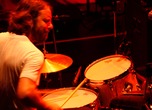
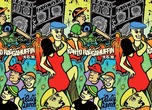
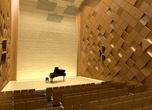

Add your comment